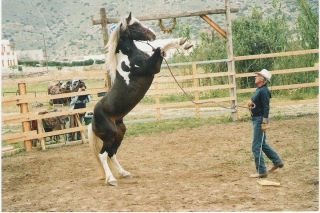Relationships
Horse Whispering for Life Enrichment
Interacting with Horses for Emotional, Mental and Physical Benefits.
Posted July 8, 2014

practicing appropriate interaction with horses helps humans to become more highly functional in all their relationships
Horses are a big part of our life and have been for a very long time. According to Wikipedia, humans began to domesticate horses around 4000 B.C. and their domestication is believed to have been widespread by 3000 B.C.
We bet on them. We compete on them. We police crowds and engage in warfare on them. We use them in beer commercials. We ride them as we gaze over a cliff at the ocean on vacation, and they pull us in a carriage through Central Park.
And we derive products from them too, including meat, milk, hide, hair, bone, and pharmaceuticals extracted from the urine of pregnant mares.
However, more recently individuals, therapists and even corporate teams have been interacting with horses to gain emotional, mental and physical benefits from their equine pals.
People search high and low for that “magic bullet” and “perfect coach” and “high experience” that will help them lower stress, gain self-awareness and learn how to take charge of their life and better navigate in day-to-day situations. People have tried walking over coals, herding cattle at dude ranches and climbing on ropes courses to build self-esteem and bond leadership teams and now many are turning to equine-assisted programs to give them a real, honest insight about themselves that might not have been revealed otherwise. And there’s some good reasons why horses are taking on this new role.
As prey animals, horses have roamed and survived this planet for thousands of years, and have developed a finely tuned intuition that can reflect a person’s emotional state at any given moment. Since we live in a culture that has taught us not to feel or express emotions, horse whisperers are showing us how horses can mirror our emotions and through that process, we can reach a place in our human hearts and psyches that more traditional therapies may not have touched before.
I had the pleasure of meeting a horse whisperer and learning about equine therapy from one of the best in the industry, Franklin Levinson, first in Maui at his former training facility and more recently in Crete, Greece where he and his wife Ilona currently live and teach.
Levinson shared one example of how people have insights when with horses. "The truth is that sometimes parents and business leaders who I train with horses tell me: 'I know I've been hard on my kid or my staff, and I realized this when I saw how I was with my horse”, Levinson said.
Levinson also takes horse whispering one step further, for children with disabilities. Levinson has worked with children with various handicaps ranging from physical to mental. He states,” Forging a relationship with horses is empowering and can bring miraculous results, especially with autistic and ADHD children. Horses often and easily hold the attention of such children, becoming a living sounding board for them to interact with, while also teaching them important partnership skills.
We can also learn about how we judge ourselves, and others, according to Levinson. "Too often, grand prix riders - even those with rooms full of trophies - are critical of horses that they describe as 'crazy' or 'stubborn' when they refuse to take a jump," says Levinson. "All the blame is put on the horse. Truthfully, there's no such thing as a 'bad' horse. But there are plenty of fearful horses. The unwanted behavior is a symptom of fear. We should not judge horses in human terms. Indeed, any horse can be inspired to be more cooperative if the human becomes the trustworthy great leader.”
Levinson has taught me that horse whispering may not even be as much about riding as it is about understanding the horse and, by extension; ourselves. “Perhaps all that is required is the right guidance to trigger our own intuition and judgment. Sometimes all it takes is one good look at ourselves to change something," says Levinson.
“To be good with horses at a high level requires us humans to come forward with some of our best qualities and attributes”, Levinson continues. “Similar to a 'great parent', successful relationships with horses require compassion, kindness, precision, patience, clarity, knowledge great leadership, acquired skills and more.”
It is clear that practicing appropriate interaction with horses helps humans to become more highly functional in all their relationships.
Levinson’s "Life Enrichment through Fun with Horses" experience is done through fun, non-stressful and mutually successful interaction with an appropriate horse. It supports introspection and self-inquiry through the quality of the on the ground interplay between the horse and human. People come away from the program having had an experience of horses far beyond a lovely trail ride. These experiences can enhance and expand inner-peace, compassion, confidence, patience, tolerance, focus, presence, self-esteem, communication, leadership and partnership.
For more on the courses Frank an Ilona offer visit www.WayoftheHorse.org




